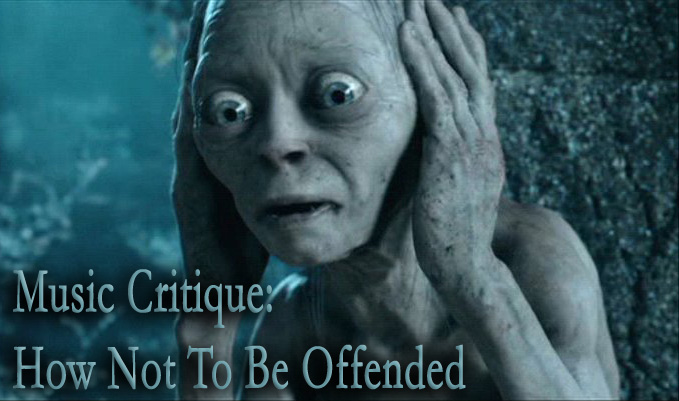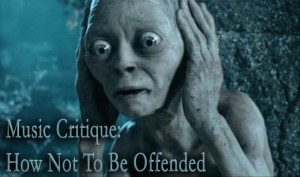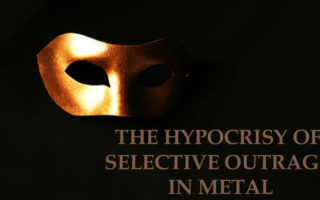Back in 1997 I started sending out my first batch of demo tapes for my band, Cea Serin. I would send tapes to anyone and everywhere. Any webzine, magazine, fan site, or record label out there that would reply to me would get a demo tape. Sometimes I got really great reviews and this made me feel great: “hey, someone really likes my stuff.” But then there were other times I would get some negative reviews: “uh oh, looks like I didn’t fool that guy.”
I would get upset and offended at any negative comments towards my art; it would destroy me for days and trump any positive reviews that previously came in. I could get a hundred glowing reviews but that one bad review would ruin my mood for weeks. But then I grew a bit and learned some things. Some things and some stuff. Over the space of, I guess a year or so, I developed an understanding of the world around me, the people in it, and how I view myself and what I create. I learned that “it’s not what they think, it’s what you know.”
And here’s my journey to that realization.
First of all, it’s important to know that any action/reaction, statement, or criticism by someone is the sum result culled from their own life experience. To me, and this is what I always say to people, knowledge is the process of being presented with facts in your daily life, you then take those facts and internalize them, and when you adapt those facts into your life you gain wisdom. Some people can’t integrate facts into their life and they become miserable as they make the same mistakes over and over again; some people can take these facts and utilize them appropriately and be able to learn and grow as a productive individual. Of course, sometimes we always don’t experience facts but more subjective observations. We experience things by watching other people go through them. All these life experiences we gather help us survive.
The same can be said about how we critique things: our personal views on music, on art, and how we favor the things that surround us. These views are based on personal preferences that have been built inside us through years of living and viewing. Just because someone says that they think shredding guitar solos stink doesn’t mean that shredding guitar solos are objectively bad. It’s just not for them.
It’s like what Victor Wooten says in his book “The Music Lesson.” Just because you don’t like bluegrass music doesn’t mean that it’s the fault of bluegrass. It’s your fault for not realizing what that type of music has to offer. There are millions of people that love bluegrass music. Who are you to say that bluegrass is bad?
The way I no longer feel bad about someone saying something awful about what I’ve written is pretty easy:
When I write a song I listen to that voice inside me. And if that voice is saying, “this part isn’t that great.” I keep working and writing the riff until that voice inside me says, “alright, this part is fucking great.” Some song writers are happy with writing a song, getting to part they think is okay, then moving on. Not me. I want every musical part of a song to make someone say, “damn, I want to learn how to play that.”
When I’m done with the song I can say that I’m 100 percent pleased with the music. The same goes with the lyrics. If a line stands out to me and there’s this nagging voice inside me saying, “that line is kind of hacky” then I keep working on the lyrics until I’m 100 percent happy with it. I have to be happy with the flow of the consonants, the overall beat, the word choice, what the line is portraying, and the rhyme scheme.
When I record stuff and I’m playing my bass, the keys, or doing vocals that same voice applies. I keep recording the vocals until I know I’ve captured a compelling, on pitch, vocal performance that I’m happy with. Not just something that is sung in key but something that has an emotional resonance – a compelling performance is most important.
Then when the whole product is ready to go I can look back at it and say, “yes, that represents who I am. I’m happy with this.”
 Any critique that comes my way on that piece of music I can then easily dismiss. If they say the vocals are crap then I can easily say, “they can fuck themselves because those vocals got it goin’ on.” If they say the songs are too long I can easily say, “screw you, the songs are as long as they need to be.”
Any critique that comes my way on that piece of music I can then easily dismiss. If they say the vocals are crap then I can easily say, “they can fuck themselves because those vocals got it goin’ on.” If they say the songs are too long I can easily say, “screw you, the songs are as long as they need to be.”
Whenever I’m 100 percent satisfied with the end result then no one can tell me otherwise. I know best. Because it’s not what they think it’s what I know.
The reason why it affected me in the past was because I was still learning how to write, still learning how to sing, still learning how to record. I would record parts and the voice inside me would say, “I don’t think people will be able to know that that’s a bit off time or not in key.”
But guess what, if you know that it’s not right then the odds are that someone else out there will be able to tell as well.
Sam Raimi said something years ago when he was talking about making movies. He said that if you’re doing something and you think it’s really cool then the odds are that there are other people out there that will think it’s really cool, too. Just apply that bit of thinking to everything you do. If you think something you played to tape isn’t quite right then keep working at it until it is. Because if you think it sounds fucked up then the odds are someone else will think it’s fucked up. And when the reviews come in and they say that the music doesn’t sound tight it’s going to destroy you. But when you say, “man, this sounds great. This is really cool.” Then the odds are that there are other people out there that will think the same.
The reason why people feel upset over bad reviews is because they feel that they didn’t fool that person. Any person with self esteem that is proud of their work won’t feel this way. No one’s opinion should be able to sway your OWN opinion of the work that you’re proud of.
I don’t give a fuck if Yanni himself came to me and said, “sorry, I just don’t think you write good songs.” I have the highest respect for Yanni and his song writing. Anyone that knows me knows that he’s my favorite song writer. At this point in my life no one can convince me that what I’m doing is bad. No one.
Because I keep going until I know that I’m 100 percent proud of the end product.
This self confidence has spilled over into my personal life as well.
If I’m in a relationship with someone and that relationship ends then I don’t think it’s anything personal to do with me If a girl says, “I’m sorry but this just isn’t working out” I don’t think that I’m a bad person or that I’m not worthy of her. I just know that I’m not the right person for her. She’s not saying that I’m a bad person or undatable for everyone else on the planet, just for her. I don’t suit her tastes and what she needs in life. That’s fine. It has no bearing on how I feel about myself.
If someone doesn’t hire me for a job I don’t take it personally. I’m just not the right person they’re looking for. They might be looking for someone with a different college degree or who is available for different hours. It’s nothing personal.
Let me take the time to say that there is a difference between self-confidence and arrogance. I also want to sum up how “pride” fits in.
First of all there is no such thing as having too much self esteem. It’s like having too much health or having too many friends. Self esteem is knowing that you can go through life, being who you are, and being knowledgeable that you deserve happiness and are capable  of attaining it. When people confuse high self esteem with arrogance it either demonstrates someone’s lack of self esteem and not an overabundance. People with high self esteem don’t concern themselves with how they stack up to others. They’re only satisfied about their own work and how it amounts to themselves. Someone with high self esteem doesn’t need to be happier than someone else, they just need to be happy with who they are.
of attaining it. When people confuse high self esteem with arrogance it either demonstrates someone’s lack of self esteem and not an overabundance. People with high self esteem don’t concern themselves with how they stack up to others. They’re only satisfied about their own work and how it amounts to themselves. Someone with high self esteem doesn’t need to be happier than someone else, they just need to be happy with who they are.
Self-esteem relates to how we experience our own competence and values and Pride fits in to this because it relates to the pleasure we receive from our own competence and achievements. Self esteem looks at our competence and says “I can,” and Pride looks at our achievements and says “I did.”
Pride has nothing to do with bragging and boasting. Satisfaction in a sense of fullness is where it comes from. And you can still acknowledge your errors and your imperfections and still experience pride.
So if I get a review and it’s like, “uh, you know, progressive metal isn’t really my thing. I don’t like the long songs or the noodling on the guitars. I don’t like the high pitched vocals mixed with the death metal vocals. I’m just not feeling it.” That’s totally fine. This has no objective statement on whether or not what you’re doing is good or bad.
Sometimes someone will say, “look, this guy can’t sing.” They’ll make a definitive judgement on your skill level. These are a bit harder to deal with if you don’t have high self esteem. But it all falls back into what I was talking about. If you like the way you sing and you like your vocal performance then you should know that whoever said you can’t sing can go fuck themselves.
There are a bunch of bad movies that I watch. I wade through a lot of shitty horror movies to get to the one or two really great ones. I write about how awful these horror movies are. And the directors for those movies should feel bad about what they’ve done. Because there’s no way that they made those movies and were like, “yeah, this is some good stuff.”
There are people that just slap albums together, throw movies together, sling paint against canvas without a care in the world over quality. They just want it done say they can say, “look at what I did.”
Those people should feel bad about what they do when the bad reviews roll in.
The artists of the world who have nothing to say, nothing to add, nothing to contribute: these people should be the ones adversely affected by bad reviews.
But if you love your craft and you take your time to make a product that you’re 100 percent proud of, then there should be nothing that anyone says that will change your mind about how you feel about it.
Always keep this in mind, “it’s not what they think, it’s what you know.”






